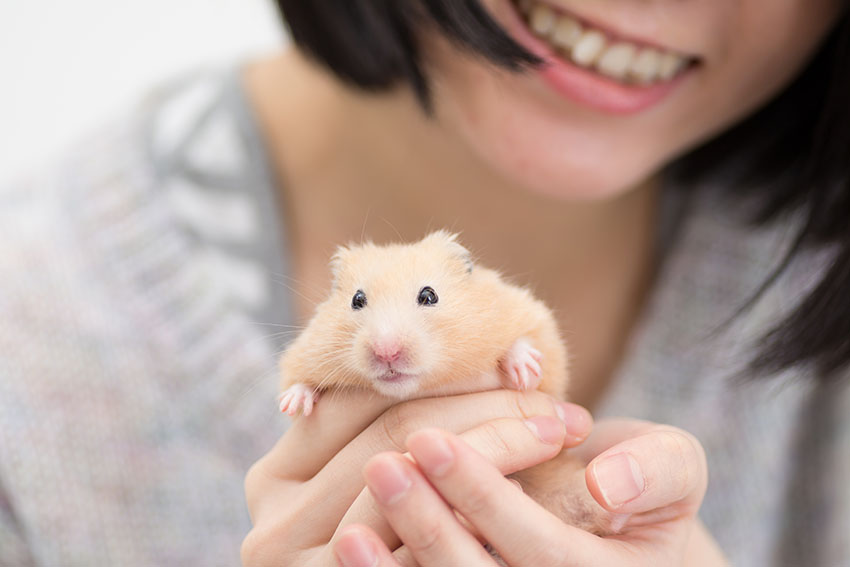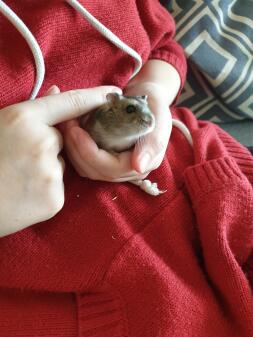Hamsters are one of the easiest pets to look after, but there are still a few things to consider before buying one:
- Can you commit to the hamster for its natural lifespan?
- Who is the pet for?
- Can you afford a hamster?
- Are you allergic to hamsters?
- What level of companionship are you looking for from your pet?
- Do you have space for a hamster?
- Have you kept a pet before?
Hamsters require care throughout their lives, and bringing one home is not a decision you should take lightly. If you adopt or purchase a pet it’s not good for the animal’s wellbeing if you then change your mind about it later. Pets should be thought of as members of the family.
Hamsters need a lot less attention than some pets, but they still require daily care. They need to be fed, and you need to interact with them, especially if you have a hamster variety that needs to be kept on its own. They bond with their owners and thrive on lots of stimulation, so playing with your hamster is a daily commitment.

Hamsters enjoy quality time with their owners
Is the hamster being bought for a child or an adult? If it’s for a child (over the age of ten), there are two things to consider. First, hamsters are a nocturnal species, which means kids will have very limited windows of opportunity to play with them. Perhaps you should consider a gerbil, as these little rodents are more active during the day and might therefore be a better choice.
If the hamster is for a child, an adult will still have to do lots of the looking after. Placing responsibility for the care of an animal on a child can easily result in unhappy and stressed children – and hamsters too! The adult should oversee daily feeding, regular health checks, and cage cleaning. If that’s no problem, a hamster will make a great addition to your family.
Hamster maintenance won’t break the bank, when compared to cats, dogs, and even guinea pigs. They’re small animals with modest demands in terms of space and food. Once you’ve purchased the living space for your pet and the hamster itself, the only regular costs will be bedding (which needs changing regularly) and food.
Pet healthcare is another outlay. Hamsters sometimes fall ill and need the attention of a vet. Treatment, and medication, can cost quite a lot, so this is something to bear in mind when doing the math. Basically, can you afford to look after them if they’re ill? There are various pet insurance policies available. For an idea of the kind of ailments that might afflict a hamster, take a look at our section on hamster illnesses.

Like any other pet, hamsters sometimes fall ill
Before buying a hamster, you need to make sure that no one in the family has an allergy. If someone is allergic to cats, dogs, or household dust, for example, they will almost certainly have a negative reaction to the allergens produced by hamster fur. Symptoms of such an allergy include sneezing, a runny nose, itchy eyes, coughing, and asthmatic reactions.
Do you want a pet that takes up little time, or a constant companion? Hamsters tick the first box, but not the second. Do you want to spend time outdoors with your pet? A hamster’s not what you’re looking for, then. Are you a night owl, or an early riser? Hamsters will be around late and early, but not the in-between bits. A gerbil or Guinea pig might be a better choice if you’re a late riser. Or perhaps a cat or dog will be a better choice.
Think about what you actually want from your pet. Will the hamster supply it? They’re not, for example, going to sit in your lap for hours purring, and you can’t take them out for a walk. Nor can you sprinkle food into their cage and think that’s enough care and attention. Also, will you ever be around to get the most from your largely nocturnal little pal?
Hamsters may be very small, but they still need a corner of your house or apartment to call home. Good hamster cages are quite bulky, and you’ll need to sort out where it’s going to go before bringing it home.
Bedrooms are not the ideal locations for hamster cages. They are active – and noisy – at night, and will rustle through their cage, gnaw at the bars, suck at the water bottle, and spend hours in the exercise wheel – all of which equals noise.
If you’re not sure where to put your hamster cage, have a look at our Where Do I Put My Hamster Cage? section.

Hamsters are furry, fun, and friendly
If you’ve never had a pet before, you might not realize what a responsibility it is. If possible, see if you can borrow a friend’s pet for a week or two, maybe while they’re on vacation. In looking after the hamster, you’ll be able to judge whether or not feeding, cleaning, and playing with it every day is something you could easily manage. Beware the novelty value of a new pet (especially with kids) - the novelty soon wears off.

Comments
Eric, 11 April 2023
hamsters are great simple pets. article is great, but the life span should be mentioned. I have had 2 hamsters that died with one and half years.. if you get to attached and can't handle the death of a great pet.. then you might not get one.. otherwise that 1.5 years was worth it to
Alexa, 15 April 2021
okay, so my hamster died last week, but these tips help! the only other question is should I get another one? i kinda really want to!